The global economy has undergone radical transformations in recent years, becoming more hyperconnected, artificial intelligence (AI) driven and sustainability focused. These shifts present both unique challenges and opportunities for businesses worldwide and the leaders at their helm. Representing the best of East and West in a global setting, Singapore is an ideal location for those seeking knowledge and skills to remain relevant in an uncertain landscape.
“Singapore is well known for high-quality education and is considered to be one of the leading business and innovation hubs, not only in Southeast Asia but also in the world. So, it made sense to choose Singapore to pursue a Master of Business Administration (MBA),” said Mr Pravin Raj, who is from Malaysia and is a graduate of the Nanyang MBA from Nanyang Business School (NBS) at Nanyang Technological University (NTU).
“NTU appealed to me for several reasons, including world-class professors with extensive knowledge across various industries,” added Mr Pravin, who holds a first-class honours bachelor’s degree in marine engineering from a prestigious British university. “NBS also put together a diverse class profile with participants from different nationalities and sectors, contributing to an enriching learning experience.”
After graduating in 2018, Mr Pravin, 38, took on a strategic planning role with a global multinational corporation based in Singapore. He strongly recommends the Nanyang MBA for those in technical roles. “Don’t be put off by limiting beliefs about non-commercial backgrounds; you can pivot to business strategy and commercial leadership roles.”
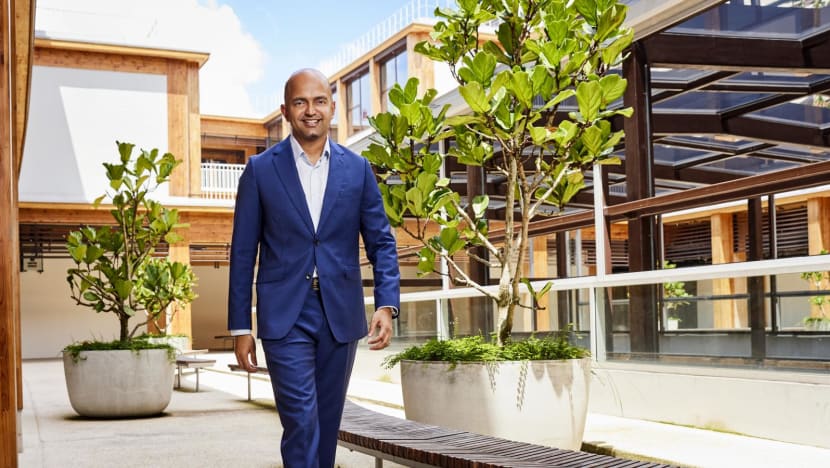
WHY CHOOSE NANYANG BUSINESS SCHOOL
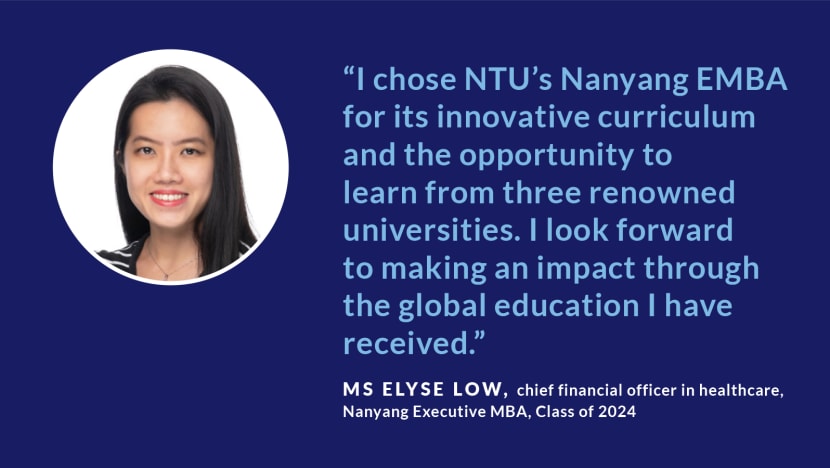
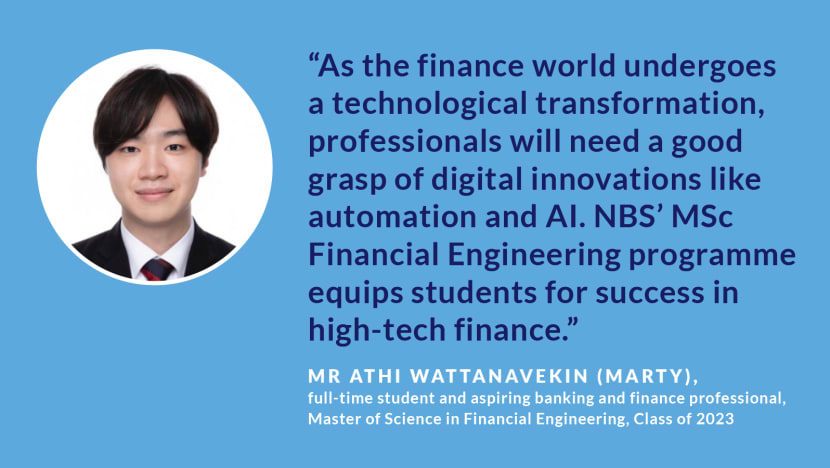
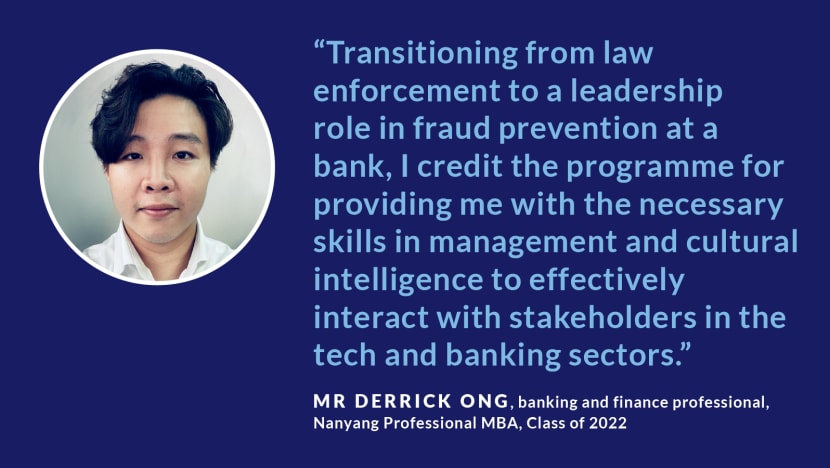



RENOWNED FOR INNOVATION
Innovation, particularly in frontier technologies such as generative AI, is at the core of the dramatic shifts in our work and lifestyles. As a business school within a technology-focused university, NBS is in a unique position. It prepares today’s managers and executives in Singapore and the region with the skill sets needed to thrive in a changing international environment. This is encapsulated in the school’s ethos to innovate for the future, lead with impact and transform with cultural dexterity.
The robust curriculum at NBS focuses on new and globally relevant technologies, with postgraduate programmes on digital transformation, AI and blockchain technology, among others. The school also leverages NTU’s broad ecosystem of expertise, and co-designs and co-teaches programmes like the Master of Science in Financial Engineering with faculty from NTU’s School of Physical and Mathematical Sciences.
This dedication to innovation leads students from the region to study at NTU. Take Ms Natashya Tiro, from Indonesia, who chose to pursue her postgraduate education in Singapore with a Master of Science in Business Analytics at NBS. The 22-year-old graduated with a bachelor’s degree in industrial engineering last year. While working on a research project on algorithm optimisation for logistics, she discovered an interest in data analytics.
“To achieve my goal, I wanted to improve my technical skills and obtain hands-on experience from global experts, which NBS provides,” said Ms Tiro, who hopes to start her career in data analytics with a supply chain or manufacturing company in Singapore after she graduates next year. “Learning how to bridge the gap between business and cutting-edge technology is important to have a successful career.”
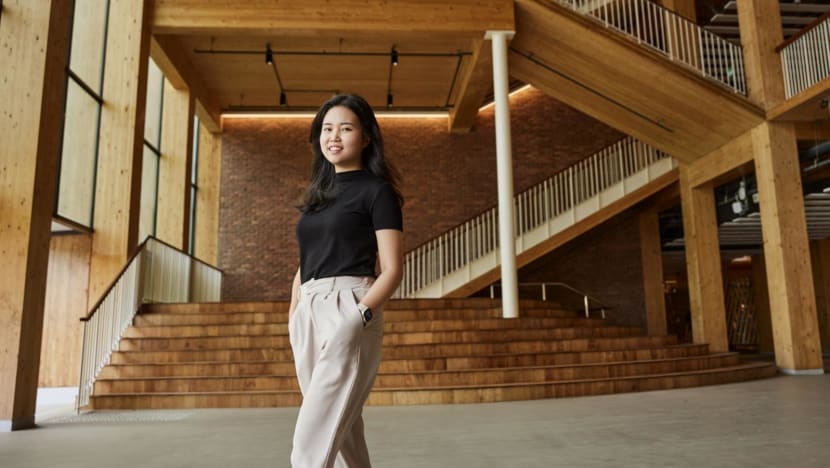


PRIORITISING GREEN BUSINESS PRACTICES
As sustainability becomes a top priority for governments and businesses worldwide, NBS emphasises creating sustainable solutions. The school’s MBA programmes are designed to groom leaders with a thorough understanding of sustainability and its critical role in society.
“Empowering individuals, organisations and communities to innovate for sustainable social impact motivates and gives me purpose,” said Ms Tan Yan Yan, a Singaporean pursuing the Nanyang Fellows MBA and graduating this year. The 39-year-old is a senior assistant director of strategy planning at the National Council of Social Service in Singapore.
“The programme’s design not only equipped us with critical business and management skills but also taught us to look at a company’s sustainability from the environmental, social, governance and business angles, and how each dimension can complement the others rather than stand alone.”

Reflecting NTU’s leadership on global issues, NBS is home to the Centre for Business Sustainability, which facilitates the school’s MBA specialisation in business sustainability and provides graduates with the required knowledge and skills to lead in an ever-evolving economy.
Those interested in environmentally friendly architecture will also appreciate the sustainable buildings on the NTU campus. NTU houses half of Singapore’s net-zero energy buildings, with Gaia, NBS’ new home and Asia’s largest wooden building, being the 8th and latest addition.
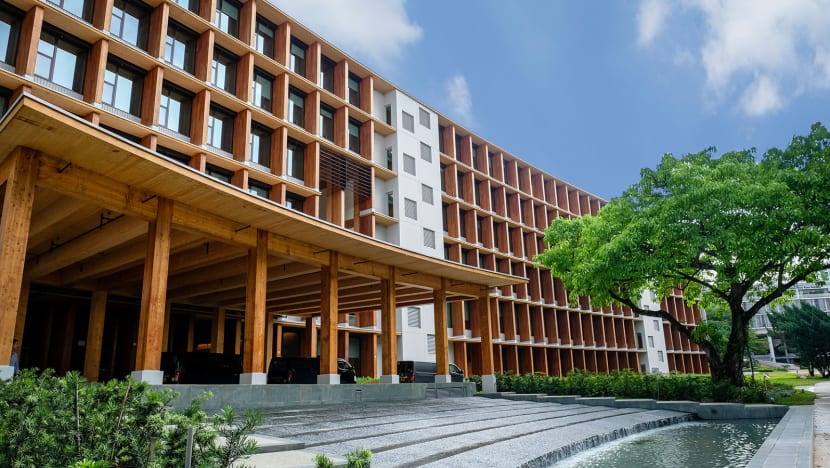
Nanyang Business School’s new home, Gaia is Asia’s largest wooden structure and Singapore’s 8th net-zero energy building. Photo: Nanyang Business School


GRANTING ACCESS TO GLOBAL NETWORKS
In the increasingly interconnected global economy, NBS provides students access to a wide network of leading experts, partnerships with top universities, and a global student body and alumni network. For instance, NBS houses the Centre for Leadership & Cultural Intelligence, to provide business leaders with the skills needed to function effectively in culturally diverse situations.
The school also collaborates with prestigious universities in China, Japan, the United States and Europe. Programmes with these overseas partnerships include the Master of Science in Financial Engineering (Carnegie Mellon University), Nanyang Fellows MBA and Executive MBA (University of California, Berkeley, and Tsinghua University), and Nanyang-Waseda Double MBA (Waseda Business School).
Ms Tan, for one, was drawn to the potential of these global connections. “I was attracted to the opportunities to engage with a diverse and international cohort of leaders from the public and private sectors, and the access to East and West perspectives through the UC Berkeley and Tsinghua segments,” she said.
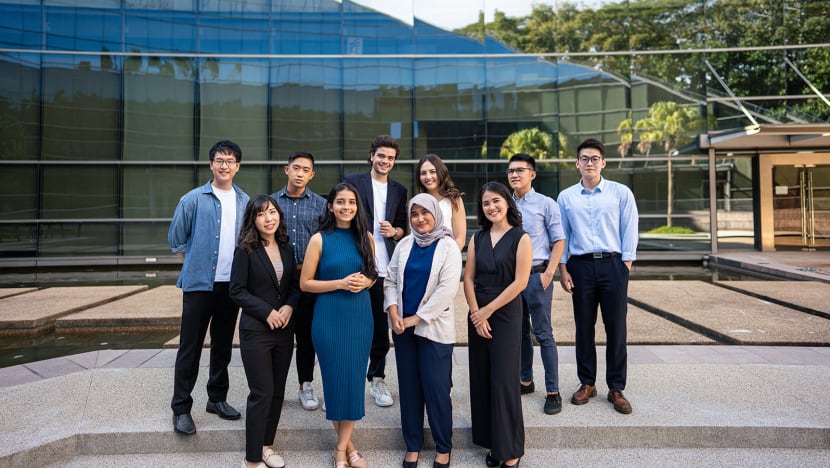
Meanwhile, NBS’ global alumni network spans more than 160 countries, enriching the students’ learning through varied perspectives. “The diverse cohort in NBS makes our experience far more interesting, because the students can exchange and learn about different fields, countries, governments and cultures,” said Ms Tiro.
“This enriches the learning experience and encourages me to see problems and opportunities from different standpoints. I also made lifelong friends at NBS.”
NTU’s standing as a top-tier global university, having earned the top spot in Times Higher Education’s Young University Rankings in 2023 and ranked among the top five in Asia by QS World University Rankings 2024, draws an international and multicultural student population. This diversity cultivates an environment that fosters cultural intelligence and dexterity, equipping NTU students for success in a rapidly changing world.
Whether you want to pivot to a business strategy role, lead in a tech-driven world or make a difference in creating sustainable solutions, NBS has a postgraduate programme tailored for your career growth.
TAKE YOUR PICK: POSTGRADUATE PROGRAMMES AT NANYANG BUSINESS SCHOOL















